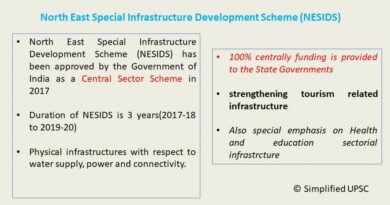Intergovernmental Panel on Climate Change (IPCC)
Context
Recently, the Intergovernmental Panel on Climate Change (IPCC), released the second part of its sixth assessment report. This second part of the report is about climate change impacts, risks and vulnerabilities, and adaptation options.
Contents
About IPCC
- The Intergovernmental Panel on Climate Change (IPCC) is an intergovernmental body of the United Nations responsible for advancing knowledge on human-induced climate change.
- It was established in 1988 by the World Meteorological Organization (WMO) and the United Nations Environment Programme (UNEP), and later endorsed by United Nations General Assembly.
- Headquartered in Geneva, Switzerland, it is composed of 195 member states.
- It has 195 member states.
- The IPCC provides objective and comprehensive scientific information on anthropogenic climate change, including the natural, political, and economic impacts and risks, and possible response options.
- It does not conduct original research nor monitor climate change, but rather undertakes a periodic, systematic review of all relevant published literature.
- Thousands of scientists and other experts volunteer to review the data and compile key findings into “Assessment Reports” for policymakers and the general public; this has been described as the biggest peer review process in the scientific community.
- The IPCC is an internationally accepted authority on climate change, and its work is widely agreed upon by leading climate scientists as well as governments.
- Its reports play a key role in the United Nations Framework Convention on Climate Change (UNFCCC), with the Fifth Assessment Report heavily informing the landmark Paris Agreement in 2015.
- The IPCC shared the 2007 Nobel Peace Prize with Al Gore for contributions to the human understanding of climate change.
- On Monday, February 28, 2022, the IPCC released its sixth assessment report.
- The IPCC is governed by its member states, which elect a bureau of scientists to serve for the duration of an assessment cycle (usually six to seven years); the bureau selects experts nominated by governments and observer organisations to prepare IPCC reports.
- The IPCC is supported by a secretariat and various “Technical Support Units” from specialised working groups and task forces.
The IPCC has three working groups:
- Working Group I, dealing with the physical science basis of climate change.
- Working Group II, dealing with impacts, adaptation and vulnerability.
- Working Group III, dealing with the mitigation of climate change.
Sixth assessment report Important Observations
- Population at Risk: Noting that over 3.5 billion people, over 45% of the global population, were living in areas highly vulnerable to climate change.
- Indian Scenario: The report identifies India as one of the vulnerable hotspots, with several regions and important cities facing very high risk of climate disasters such as flooding, sea-level rise and heat-waves.
- For example, Mumbai is at high risk of sea-level rise and flooding, while Ahmedabad faces serious danger of heat-waves.
- Complex, Compound and Cascading Risks: The latest report warns that multiple disasters induced by climate change are likely to emerge in different parts of the world in the next two decades.
- Multiple climate hazards will occur simultaneously, and multiple climatic and non-climatic risks will interact, resulting in compounding overall risk and risks cascading across sectors and regions.
- Near to Long-term Risks: Even if adequate efforts are made to keep the global rise in temperatures within 1.5 degree Celsius from pre-industrial times.
- Even temporarily exceeding this warming level will result in additional severe impacts, some of which will be irreversible.
- The magnitude and rate of climate change and associated risks depend strongly on near-term mitigation and adaptation actions.
- Projected adverse impacts and related losses and damages escalate with every increment of global warming.
- Coupled System: There is a strong focus on the interactions among the coupled systems climate, ecosystems (including their biodiversity) and human society.
- Regional Variation: Vulnerability of ecosystems and people to climate change differs substantially among and within regions.
- These are driven by patterns of intersecting socio-economic development, unsustainable ocean and land use, inequity, marginalization, historical and ongoing patterns of inequity such as colonialism, and governance.
- Health Impacts of Climate Change: It has found that climate change is increasing vector-borne and water-borne diseases such as malaria or dengue, particularly in sub-tropical regions of Asia.
- It has also said deaths related to circulatory, respiratory, diabetic and infectious diseases, as well as infant mortality, are likely to increase with a rise in temperature.
- Increasing frequency of extreme weather events like heatwaves, flooding and drought, and even air pollution was contributing to under-nutrition, allergic diseases and even mental disorders.
- Current Adaptation and its Benefits: Progress in adaptation planning and implementation has been observed across all sectors and regions, generating multiple benefits.
- However, adaptation progress is unevenly distributed with observed adaptation gaps..
- Many initiatives prioritise immediate and nearterm climate risk reduction which reduces the opportunity for transformational adaptation.
- Gaps in Adaptation: The report also highlights large gaps in the adaptation actions that are being taken and the efforts that are required. It says these gaps are a result of “lack of funding, political commitment, reliable information, and sense of urgency”.
- Adaptation is essential to reduce harm, but if it is to be effective, it must go hand in hand with ambitious reductions in greenhouse gas emissions because with increased warming, the effectiveness of many adaptation options declines.
- Need for Holistic Changes: It is clear now that minor, marginal, reactive or incremental changes won’t be sufficient.
- In addition to technological and economic changes, shifts in most aspects of society are required to overcome limits to adaptation, build resilience, reduce climate risk to tolerable levels, guarantee inclusive, equitable and just development and achieve societal goals without leaving anyone behind.
Source: Indian Express
You can find many articles on ENVIRONMENT (part of GS III) in our website. Go through these articles share with your friends and post your views in comment section.
Discover more from Simplified UPSC
Subscribe to get the latest posts sent to your email.



